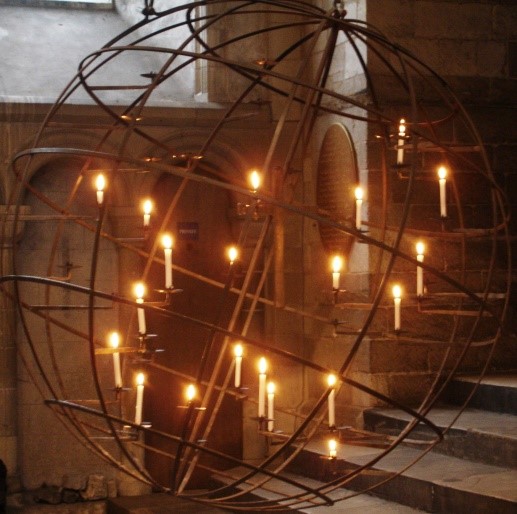This contemplation is also available as an audio recording.
After some 10 weeks of Covid-19 restrictions, here in the UK there has been some easing in the guidance. The relaxation in the guidance is slightly different in Scotland to England, though, reflecting the local picture as it should do.
Also, the changes do not benefit everyone. Those who are and have been socially shielding are still required to do so and for everyone else social distancing outside of one’s immediate household remains a necessity.
The relaxation has meant for many, though, that over this past week they have been able to begin interacting with others outdoors so long as it is at a safe social distance. There is not the option to meet indoors yet nor would it appear that the option to come indoors to meet with more than one other household will come for some time yet. Meeting as church will come, but is still, therefore, some way off. However, meeting together eventually is something I look forward to.
These recent changes in the guidance and those that are still to come have had me reflecting on the nature of community.
Community is at the very heart of the Christian faith. The trinity itself speaks of community through the relationship of Father, Son and Holy Spirit. We speak of the church as the body of Christ; collectively we act for him and show him forth. As Paul makes clear in chapter 12 of the book of Corinthians, the body is made up on many parts and not one. Every part matters and is inter-dependent on the other parts for the whole to function at its best. The hand does not get to say to the foot that it is not needed; the mouth is not more necessary than the eye or any other body part for that matter; size does not reflect value.
Yet, while this is the case, we nonetheless experience the Christian faith at a profoundly personal level. I kneel and confess my sins and I have a sense of a ‘personal relationship’ with God through the Spirit. There is solitude in that sense to my faith by which I do not mean that my faith leaves me lonely. Solitude is not loneliness. Loneliness is a feeling of being bereft and without others whereas in solitude we can find space to be with God. As such, solitude has an important role to play in our faith journey.
Henri Nouwen speaks about community in terms of solitude. He says that, ultimately, it is from our solitude that we greet another’s solitude and describes how ‘our various solitudes are like strong, straight pillars that hold up the roof of our communal house’ and ‘thus solitude always strengthens community’ (page 30, Bread for the Journey by Henri Nouwen).
Indeed, I cannot think of a biblical example that points us to living our faith solely as a private experience. Everywhere I see, rather, the call to community; the call to gather and break bread together, to pray together, and to worship together amongst many other ‘togethers’.
Coming together ‘virtually’ has been happening throughout lockdown as people have used platforms like Zoom, Facetime, and Skype amongst others to meet. Coming together has also been happening as those who have not had to isolate or shield have looked after those who do; picking up their prescriptions, doing their shopping and supporting them with calls and conversation; a coming together that wraps around others not with physical ties so much as love, compassion and care.
Last Sunday was Pentecost and the church was reflecting on the gift of the Holy Spirit. In the context of reflections on Community this is timely. Ultimately, we are bound together by the Spirit; our faith marks us with his seal. We are children of God, brothers and sisters in Christ because of the Holy Spirit. Without the Holy Spirit, well, we could be a group, a club, a clique but we would not be the living body of Christ.
Community is a rich word. It is full of meaning and it IS at the heart of our faith. I have shared a few passing thoughts here, but they are in no way comprehensive nor intended to be. They are just to help us get started as the invitation of this time is to consider the call to community even in the midst of lingering lockdown and any temptation to rest in the solitude of one’s faith as we slowly come out of it.
CENTRING EXERCISE (10 minutes)
As always begin by focusing on your posture. Sit in a way that you are comfortable but remain alert.
Now, turn your attention to your breathing. Breathe deeply and be aware of how your body responds as you do so. After a time, as you breathe in, repeat silently the phrase, ‘We are one body’ and, as you breathe out, the phrase, ‘For we all share in the one bread’.
When you are ready picture a great cathedral; one you have visited or you can imagine one of your own design. Visualise the many pillars and flying buttresses that may hold up its roof. Each pillar is separate but each pillar is necessary to support the structure of the building.
Now visualise the space between the pillars without furniture; space to welcome others, space to interact, space to dance, space to be free.
Imagine yourself in this space; imagine Jesus with you in this space; imagine the community of your church in this space.
Continue in this space for as long as you are comfortable.
CONTEMPLATION (15 minutes)
There are many images that could be used to reflect on community. I have suggested a few with the photos below. The invitation is to contemplate one or more of them as an image of community.





MEDITATION (10 minutes)
The invitation is to meditate on this verse from the gospel of John:
John 15:12
My command is this: Love each other as I have loved you.
PRAYER
Gather up your reflections and let them lead you in a prayer of thanksgiving for what has been received.
© Sarah Dickinson